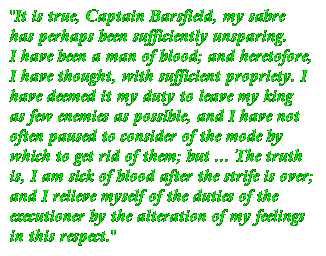


| [ Previous ] [ Next ] |

|
[published by New York: Redfield, 1854]
First in a string of five loosely connected sequels to The Partisan, Mellichampe continues the adventures of Major Robert Singleton as he searches in vain for his lost personality. But hey, even though the comment is likely to evoke a chorus of "Who are you, and what have you done with Marg?" I have to say that I sorta/kinda like this installment. For one thing, Singleton is barely in it, and for another, the narrative threads have a stronger tendency to actually go somewhere. When one mentally filters out the unfortunate elements inherent in when the book was written, there's actually something of interest left behind.

|
This installment in the never-ending "Santee" saga centers on the duel between Tarleton and Marion. (So, of course, another reason I enjoyed it is that Tarleton's in it quite a bit.) Simms pulls off a good, and at times rather complex interpretation of the neighbor-eat-neighbor struggle going on behind the military operations within South Carolina. The theme was also central to The Partisan, but it is far more successful this time, perhaps because there is a coherent story to give it a framework. (I'm not the only one who thinks The Partisan lacked in that area. In his introduction to this volume, Simms defends himself against some contemporary critic who seems to have said much the same thing.)
The core conflict of the book is between our earnest young hero, the aptly named Ernest Mellichampe -- who rides with Marion -- and Barsfield, a Loyalist neighbor. Their warring political views are largely eclipsed by a deadly personal feud going back at least to the previous generation. When Ernest is wounded in one of the endless rebel/Loyalist skirmishes in the back country, he gets left behind when Marion's men are driven off. He is about to be murdered by Barsfield -- over the protests of his eternally drooping and dewy-eyed lady love, Janet Berkeley -- when he is saved by the timely intervention of... Ban Tarleton. Yeah, I was surprised, too. And I kept being surprised through Tarleton's whole subplot. I won't say I agree with it -- vehemently the contrary at times -- but it's unusual and it makes use of known information in atypical ways. Since the first book in this series was written only a year or two after Tarleton's death -- and hence only a couple of decades after the end of his stint in Parliament -- I am almost tempted to wonder if Simms knew about the anti-war comments Ban made in the Commons.... Nahhhh... But still, as I say, it's a very different take, and hence interesting on that level.
In his introduction, Simms himself has this odd commentary (justification?) on his interpretation:
The character of Tarleton, and his deeds at this period, present a singular contrast, in some respects, to what was known of him before. ... We have, in Carolina, several little stories, such as that in "Mellichampe," in which his human feelings are allowed to appear ... Nor do I see that there is any inconsistency between these several characteristics. The sensibilities are more active at one moment than at another; and he whose mood is usually merciless and unsparing, may now and then be permitted the blessing of a tear, and the indulgence of a tenderness, under the influence of an old and hallowed memory, kept alive and sacred in some little corner of the heart when all is ossified around it.1
From here, the series drags on into Katherine Walton.
| [ Index ] | [ Previous ] [ Next ] |
| Return to the Main Page | Last updated by the Webmaster on January 30, 2004 |